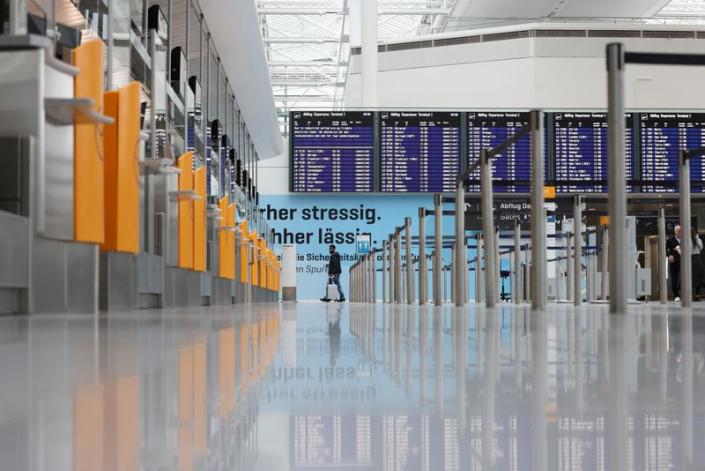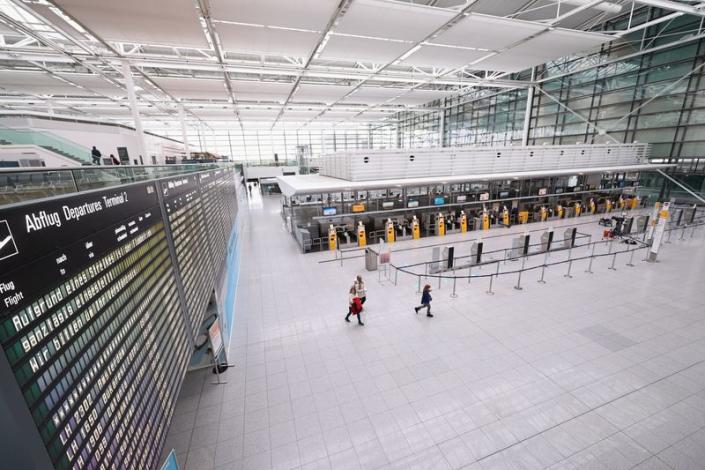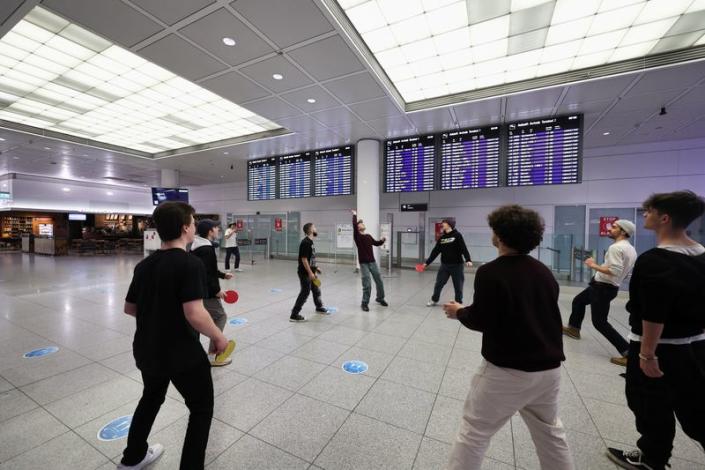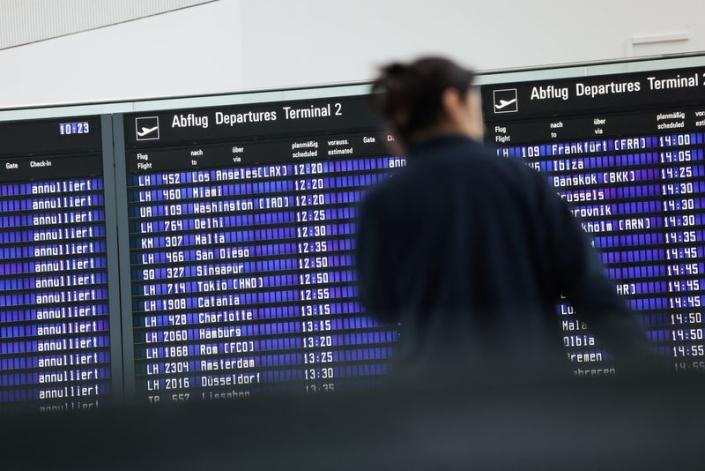Deborah COLE
Sun, March 26, 2023

Transport staff across Germany are set to stage a major strike on Monday to push for wage hikes in the face of brisk inflation, as passengers brace for serious disruptions.
Workers at airports, ports, railways, buses and metro lines throughout much of Europe's top economy are expected to heed a call by the Verdi and EVG unions to the 24-hour walkout.
"A labour struggle that has no impact is toothless," Verdi chief Frank Werneke told public broadcaster Phoenix.
He acknowledged that it would inflict pain on many commuters and holidaymakers, "but better one day of strain with the prospect of reaching a wage agreement than weeks of industrial action".
To prevent supply gaps, Transport Minister Volker Wissing has ordered states to lift restrictions on truck deliveries Sunday, while asking airports to allow late-night takeoffs and landings "so stranded passengers can reach their destinations".
Verdi represents around 2.5 million public sector employees, while EVG represents 230,000 workers on the railways and at bus companies.
The rare joint call for a strike in Germany marks an escalation of an increasingly ill-tempered dispute over a pay packet to blunt the impact of surging inflation.
Employers, mostly the state and public sector companies, have so far refused the demands, instead offering a rise of five percent with two one-off payments of 1,000 ($1,100) and 1,500 euros, this year and next.
Verdi is demanding a rise of 10.5 percent in monthly salaries, while EVG is seeking a 12-percent rise for those it represents.
- 'Massive impact' -
State-owned rail company Deutsche Bahn (DB) has completely suspended all long-distance trains for the day and many regional and local connections will be at a standstill.
DB's Martin Seiler, responsible for human resources on the company's management board, described the nationwide strike as "groundless and unnecessary" and urged the unions to return to the negotiating table "immediately".
The company expects the walkout to have a "massive impact" on its entire rail network and has pledged to inform its customers "as quickly and comprehensively as possible" about cancellations and delays.
The German airport association, which estimated about 380,000 air travellers would be affected, said the walkout "went beyond any imaginable and justifiable measure".
Employers have accused labour representatives of contributing to a wage-price spiral that will only feed inflation, while unions say their members have been asked to bear the burden of the soaring cost of living.
"Petrol and food prices have risen, I'm feeling it in my wallet," Timo Stau, 21, told AFP at a protest on Thursday in Berlin.
- 'Economic hardship' -
Like in many other countries, Germans are struggling with high inflation -- it hit 8.7 percent in February -- after Russia's invasion of Ukraine sent food and energy costs soaring.
The "mega-strike", as local media have dubbed it, follows industrial action in recent months in several German sectors, from the postal service to airports and local transport.
A third round of salary negotiations for public-sector workers is due to begin on Monday.
Earlier in March, Bremen, Berlin, Hamburg and Hanover airports cancelled more than 350 flights after security staff walked out. Bus and metro staff in Frankfurt also staged a strike.
Some unions however have succeeded in winning big pay increases.
Postal workers won average monthly increases of 11.5 percent earlier in March, and in November IG Metall, Germany's biggest union, won hikes totalling 8.5 percent for almost four million employees that it represents.
Although Monday's walkout is set to create travel chaos, it pales in comparison to the industrial disputes rocking neighbouring France, where President Emmanuel Macron's pension reform plans have ignited voter anger.
Rubbish is gathering in the streets of Paris due to a rolling strike by garbage collectors, while blockades of oil refineries by striking workers are beginning to create fuel shortages around the country.
bur-dlc/hmn/jj/lb
Sun, March 26, 2023

Transport staff across Germany are set to stage a major strike on Monday to push for wage hikes in the face of brisk inflation, as passengers brace for serious disruptions.
Workers at airports, ports, railways, buses and metro lines throughout much of Europe's top economy are expected to heed a call by the Verdi and EVG unions to the 24-hour walkout.
"A labour struggle that has no impact is toothless," Verdi chief Frank Werneke told public broadcaster Phoenix.
He acknowledged that it would inflict pain on many commuters and holidaymakers, "but better one day of strain with the prospect of reaching a wage agreement than weeks of industrial action".
To prevent supply gaps, Transport Minister Volker Wissing has ordered states to lift restrictions on truck deliveries Sunday, while asking airports to allow late-night takeoffs and landings "so stranded passengers can reach their destinations".
Verdi represents around 2.5 million public sector employees, while EVG represents 230,000 workers on the railways and at bus companies.
The rare joint call for a strike in Germany marks an escalation of an increasingly ill-tempered dispute over a pay packet to blunt the impact of surging inflation.
Employers, mostly the state and public sector companies, have so far refused the demands, instead offering a rise of five percent with two one-off payments of 1,000 ($1,100) and 1,500 euros, this year and next.
Verdi is demanding a rise of 10.5 percent in monthly salaries, while EVG is seeking a 12-percent rise for those it represents.
- 'Massive impact' -
State-owned rail company Deutsche Bahn (DB) has completely suspended all long-distance trains for the day and many regional and local connections will be at a standstill.
DB's Martin Seiler, responsible for human resources on the company's management board, described the nationwide strike as "groundless and unnecessary" and urged the unions to return to the negotiating table "immediately".
The company expects the walkout to have a "massive impact" on its entire rail network and has pledged to inform its customers "as quickly and comprehensively as possible" about cancellations and delays.
The German airport association, which estimated about 380,000 air travellers would be affected, said the walkout "went beyond any imaginable and justifiable measure".
Employers have accused labour representatives of contributing to a wage-price spiral that will only feed inflation, while unions say their members have been asked to bear the burden of the soaring cost of living.
"Petrol and food prices have risen, I'm feeling it in my wallet," Timo Stau, 21, told AFP at a protest on Thursday in Berlin.
- 'Economic hardship' -
Like in many other countries, Germans are struggling with high inflation -- it hit 8.7 percent in February -- after Russia's invasion of Ukraine sent food and energy costs soaring.
The "mega-strike", as local media have dubbed it, follows industrial action in recent months in several German sectors, from the postal service to airports and local transport.
A third round of salary negotiations for public-sector workers is due to begin on Monday.
Earlier in March, Bremen, Berlin, Hamburg and Hanover airports cancelled more than 350 flights after security staff walked out. Bus and metro staff in Frankfurt also staged a strike.
Some unions however have succeeded in winning big pay increases.
Postal workers won average monthly increases of 11.5 percent earlier in March, and in November IG Metall, Germany's biggest union, won hikes totalling 8.5 percent for almost four million employees that it represents.
Although Monday's walkout is set to create travel chaos, it pales in comparison to the industrial disputes rocking neighbouring France, where President Emmanuel Macron's pension reform plans have ignited voter anger.
Rubbish is gathering in the streets of Paris due to a rolling strike by garbage collectors, while blockades of oil refineries by striking workers are beginning to create fuel shortages around the country.
bur-dlc/hmn/jj/lb
In inflation-hit Germany, massive strike over pay to cripple transport
Sun, March 26, 2023
By Klaus Lauer and Tom Sims
BERLIN/FRANKFURT, March 27 (Reuters) - A massive strike in Germany was set to begin early Monday, crippling mass transport and airports in one of the biggest walkouts in decades as Europe's largest economy reels from soaring inflation.
In the hours running up to the strike, both sides dug in their heels, with union bosses warning that considerable pay hikes were a "matter of survival" for thousands of workers and management calling demands and the resulting action "completely excessive".
The strikes, which were scheduled to mainly start just after midnight and affect services throughout Monday, are the latest in months of industrial action that has hit major European economies as higher food and energy prices dent living standards.
Germany, which was heavily dependent on Russia for gas before the war in Ukraine, has been particularly hard hit by higher inflation as it scrambled for new energy sources, with inflation rates exceeding the euro-area average in recent months.
German consumer prices rose more than anticipated in February - up 9.3% from a year earlier - pointing to no let-up in stubborn cost pressures that the European Central Bank has been trying to tame with a series of interest-rate increases.
It has been a painful adjustment for millions of workers throughout the country as costs of everything from butter to rents rise after years of fairly stable prices.
"It is a matter of survival for many thousands of employees to get a considerable pay rise," Frank Werneke, head of the Verdi labour union, told Bild am Sonntag.
France has also faced a series of strikes and protests since January as anger mounts over the government's attempt to raise the state pension age by two years to 64.
But officials in Germany have made clear that their fight is only about pay.
The Verdi union is negotiating on behalf of around 2.5 million employees in the public sector, including in public transport and at airports. Railway and transport union EVG negotiates for around 230,000 employees at railway operator Deutsche Bahn and bus companies.
Verdi is demanding a 10.5% wage increase, which would see pay rising by at least 500 euros ($538) per month, while EVG is asking for a 12% raise or at least 650 euros per month.
Deutsche Bahn on Sunday said the strike was "completely excessive, groundless and unnecessary".
Employers are also warning that higher wages for transport workers would result in higher fares and taxes to make up the difference.
($1 = 0.9295 euros) (Reporting by Tom Sims and Klaus Lauer; Editing by David Holmes)
Sun, March 26, 2023
By Klaus Lauer and Tom Sims
BERLIN/FRANKFURT, March 27 (Reuters) - A massive strike in Germany was set to begin early Monday, crippling mass transport and airports in one of the biggest walkouts in decades as Europe's largest economy reels from soaring inflation.
In the hours running up to the strike, both sides dug in their heels, with union bosses warning that considerable pay hikes were a "matter of survival" for thousands of workers and management calling demands and the resulting action "completely excessive".
The strikes, which were scheduled to mainly start just after midnight and affect services throughout Monday, are the latest in months of industrial action that has hit major European economies as higher food and energy prices dent living standards.
Germany, which was heavily dependent on Russia for gas before the war in Ukraine, has been particularly hard hit by higher inflation as it scrambled for new energy sources, with inflation rates exceeding the euro-area average in recent months.
German consumer prices rose more than anticipated in February - up 9.3% from a year earlier - pointing to no let-up in stubborn cost pressures that the European Central Bank has been trying to tame with a series of interest-rate increases.
It has been a painful adjustment for millions of workers throughout the country as costs of everything from butter to rents rise after years of fairly stable prices.
"It is a matter of survival for many thousands of employees to get a considerable pay rise," Frank Werneke, head of the Verdi labour union, told Bild am Sonntag.
France has also faced a series of strikes and protests since January as anger mounts over the government's attempt to raise the state pension age by two years to 64.
But officials in Germany have made clear that their fight is only about pay.
The Verdi union is negotiating on behalf of around 2.5 million employees in the public sector, including in public transport and at airports. Railway and transport union EVG negotiates for around 230,000 employees at railway operator Deutsche Bahn and bus companies.
Verdi is demanding a 10.5% wage increase, which would see pay rising by at least 500 euros ($538) per month, while EVG is asking for a 12% raise or at least 650 euros per month.
Deutsche Bahn on Sunday said the strike was "completely excessive, groundless and unnecessary".
Employers are also warning that higher wages for transport workers would result in higher fares and taxes to make up the difference.
($1 = 0.9295 euros) (Reporting by Tom Sims and Klaus Lauer; Editing by David Holmes)





German workers' strike over pay is matter of survival, union boss tells Bild
Strike called by the German trade union Verdi in Munich
No comments:
Post a Comment